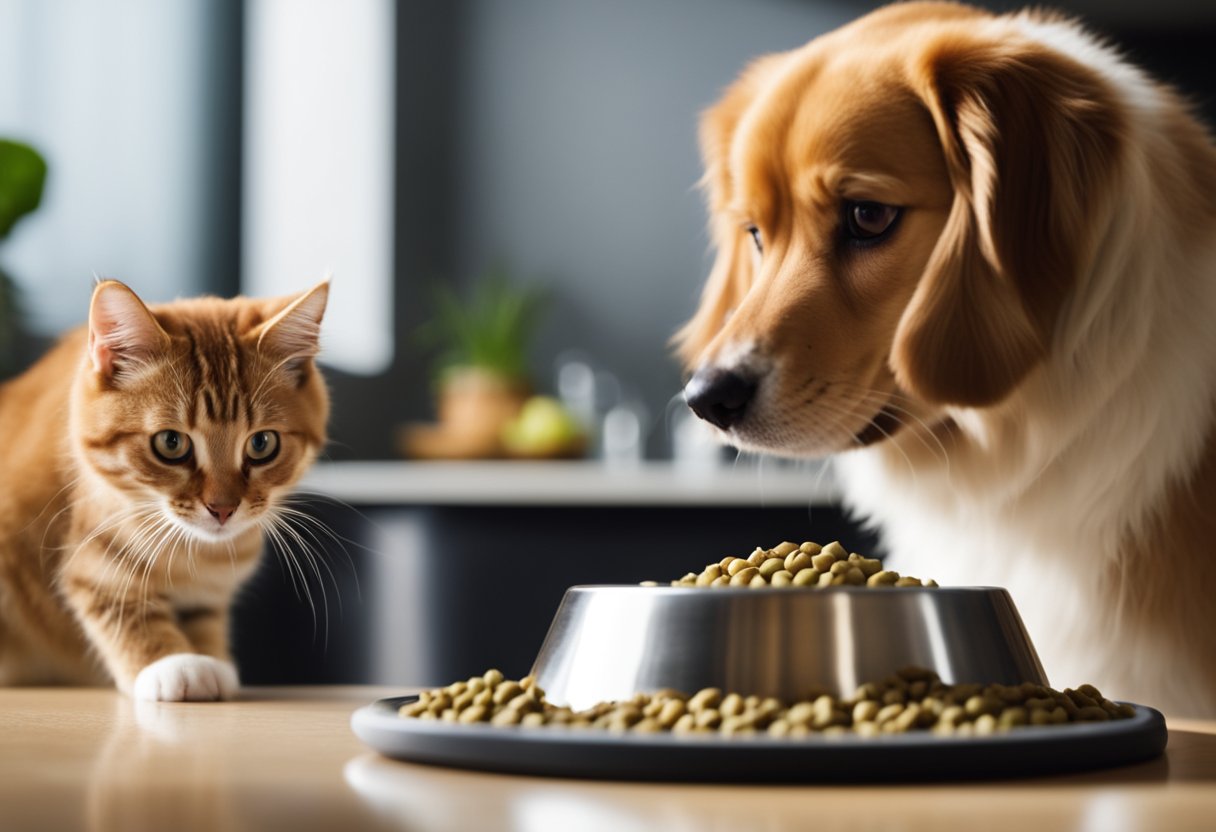When we consider our pets’ well-being, we intuitively understand that nutrition is a cornerstone of their overall health. Just as we care about what we put into our bodies, the same principle applies to our furry friends. It’s our responsibility to keep them thriving, and that starts with knowledge about proper pet nutrition. From understanding what nutrients our pets need to identifying high-quality food options, we can ensure our companions live happy, healthy lives.
Our pets’ diets have evolved with the times, and so has our understanding of their nutritional needs. Pet owners today have access to a wealth of options, from traditional kibble to specialized diets catering to specific health needs. Ensuring our pets get the right balance of proteins, fats, carbohydrates, vitamins, and minerals is essential. Join us as we explore the best feeding practices and navigate the vast array of pet food choices to keep our animal companions in top condition.
Key Takeaways
- Nutrition is essential for our pets’ health, just as it is for ours.
- A balanced diet specific to our pets’ needs leads to a happier, healthier life.
- Choosing the right pet food involves understanding nutrients and knowing what to look for.
Fundamentals of Pet Nutrition

As dedicated pet owners, we all want the healthiest life for our furry friends, and understanding the fundamentals of pet nutrition is crucial. Smart devices for pets could help us monitor and manage their diet more effectively; it’s exciting how technology intertwines with proper nutrition to enhance their well-being.
Macronutrients for Pets
Macronutrients are essential for our pets’ energy and overall health. Pets require a balanced diet that includes:
- Proteins: For muscle growth and repair. Tools like automatic feeders can help measure the precise amount they need.
- Fats: A concentrated energy source and for a healthy coat. Smart bowls can track the fat content.
- Carbohydrates: Provide energy and help with digestion. Interactive treat dispensers can make carb intake fun and controlled.
Vitamins and Minerals Essentials
Just like for us, vitamins and minerals are vital for our pets. For example:
- Calcium and Phosphorus: Important for healthy bones, available in smart, nutrient-rich treats.
- Iron: Essential for oxygen transportation in the bloodstream, trackable through smart health monitoring devices.
The Importance of Water
Water is the most crucial nutrient for our pets’ health.
- Always ensure fresh water is available through smart water fountains.
- Devices can remind us to fill up their bowls regularly to prevent dehydration.
Pet nutrition is a key aspect of their health that we can now manage more efficiently with innovations in smart pet devices. Let’s embrace these advancements for the love and care of our companions.
Feeding Practices

When it comes to ensuring our pets are healthy and happy, the way we feed them is as crucial as what we feed them. To guide us through the nuances, we’ll cover core topics such as precise portion controls, the ideal frequency of meals, age-specific dietary needs, and the wide array of diet types available for our furry companions. Let’s dive in and discover practical strategies to optimize their nutrition.
Determining Portion Sizes
It’s vital to tailor our pet’s meal sizes to their energy demands, particularly considering the type of smart devices they interact with. For example, if we’re using an automatic feeder compatible with activity trackers, we can align their portion sizes with the amount of exercise they get. Generally, small portions are recommended to avoid overfeeding, especially if less than 350 calories per cup is ideal for maintaining a healthy weight.
Feeding Frequency
For pets involved with smart devices, their feeding regime might be more consistent. We can use apps linked to feeders to set regular meal times. Most adult pets thrive on two meals per day, although automating this based on activity can prevent overeating. Our pets’ feeding frequency should align with their lifestyle, whether they’re couch potatoes or high-energy athletes.
Age-Specific Nutrition
Different life stages require different feeding strategies. Puppies and kittens, for instance, benefit from more frequent meals. As our pets age, their metabolism changes, and we must adjust their diet. Using smart devices that track health data can inform us when to switch to senior-specific nutrition protocols, ensuring they get the right balance of nutrients throughout their lives.
Diet Types and Varieties
Diet diversity is key in pet nutrition. From grain-free to raw, high-protein to low-fat, each pet’s diet will vary. Connecting our pets’ feeding to smart technology often means we can more easily rotate their foods, providing balanced and varied nutrition without causing digestive upset. This is particularly useful for pets with specific health concerns that require unique dietary adjustments.
Common Pet Food Types
When we think about feeding our furry friends, we want the best for them—which often means understanding what’s on the menu. From crunchy kibble to succulent meat, the variety is vast. Let’s explore the common types of pet food to help our smart pets thrive with the nutrition they need.
Dry Food Basics
Dry food, or kibble, is the staple diet for many pets. It’s convenient for us pet owners and often cost-effective. Kibble is praised for its long shelf life and its role in maintaining dental health, as the crunchy texture helps reduce tartar buildup. Here are the basics of dry food:
- Shelf Stability: Kibble’s low moisture content preserves it naturally, making it an easy-to-store option.
- Dental Benefits: Chewing dry food can assist in keeping your pet’s teeth clean.
Wet Food Benefits
Conversely, wet food provides our pets with hydration and is typically more aromatic, which can be beneficial for picky eaters. It comes in cans or pouches and can support pets with certain health conditions. A few points on wet food include:
- Hydration: Contains more moisture, which can help with hydration.
- Palatability: The texture and scent might be more appealing to some pets.
Raw and Fresh Diets
Raw and fresh diets are becoming more popular, as they are often seen as more natural alternatives. These diets can range from commercial frozen raw meals to fresh, refrigerated options. Here’s a quick look:
- Perceived Naturalness: Mimics what pets might eat in the wild.
- Freshness: Often free from preservatives, which we find appealing for our smart pet’s wellness.
Homemade Food Considerations
Lastly, some of us might opt for homemade food to have complete control over our pet’s diet. While this can be incredibly rewarding, it’s important to consider:
- Nutritional Balance: Ensuring the homemade diet is nutritionally complete is crucial.
- Time Investment: Preparing homemade pet food can be time-consuming and may require vet consultation to ensure it meets all dietary needs.
Pet Food Safety
As pet owners, we all want to make sure that our furry friends are eating the safest and healthiest food possible. Ensuring food safety is not just about the quality of the food we buy but also about how we handle and store it. Let’s explore the best practices to keep our pets happy and healthy.
Handling and Storage
When dealing with pet food, especially if you opt for raw diets, it’s crucial to keep it chilled or frozen to prevent bacterial growth. Always store raw pet food separately from other foods, ideally in sealed containers. Thaw frozen raw pet food in the refrigerator to maintain its safety. If any leftovers have been out at room temperature, it’s best to discard them to avoid potential foodborne illnesses.
Understanding Food Labels
Smart devices can now help us track our pets’ nutrition and decode pet food labels with ease. It is vital to read the labels carefully to ensure the food meets our pet’s dietary requirements. Look for key information on the label, such as the ingredients, expiration dates, and nutritional adequacy statements. Devices like smart scanners can assist us in identifying ingredients and understanding nutritional content, making it easier to choose the right food for our pets’ health.
Recognizing Food Allergies
Pets, just like humans, can have food allergies. Common signs include itching, digestive issues, or ear infections. If you suspect your pet has an allergy, it is essential to identify the allergen. Smart devices can come in handy by tracking your pet’s reactions to different foods and helping to pinpoint the cause. A visit to the vet is the next step for a professional diagnosis and to discuss appropriate dietary changes.
Nutritional Supplements
As pet parents, we constantly seek ways to improve our furry friends’ health and happiness. Nutritional supplements can play a key role, particularly when diet alone may not meet all their needs. We’ll explore when supplements are necessary, the benefits of digestive aids, and how certain products can support joint health. Remember, always tailor supplements to your pet’s unique needs and consider incorporating smart pet devices to monitor their well-being.
When Supplements Are Needed
In certain situations, such as age-related declines or specific health concerns, our pets might require an extra nutritional boost. For example, a dog that isn’t getting enough omega-3 fatty acids from their diet could benefit from a fish oil supplement to support heart health. Always consult with a veterinarian before beginning any new supplement regimen.
Probiotics and Digestive Aids
Probiotics are beneficial for maintaining a healthy digestive tract and supporting the immune system. These good bacteria can help:
- Normalize bowel movements
- Alleviate digestive discomfort
- Enhance nutrient absorption
Consider a smart pet feeder to regularly deliver probiotic supplements alongside meals for convenience and consistency.
Joint and Mobility Support
For pets experiencing stiffness or discomfort, supplements containing glucosamine and chondroitin can be helpful. These compounds aid in:
- Maintaining cartilage health
- Supporting joint function
- Reducing inflammation
Using a pet activity tracker can help us keep a close eye on our pets’ mobility and the effectiveness of these supplements over time.
Frequently Asked Questions
When considering the nutrition of our furry friends, we know that a balanced diet is vital. We often encounter questions about how to provide optimal nutrition through diet and supplements. Let’s address some of the common queries to help ensure the wellbeing of our pets through smart nutrition choices.
How can I ensure my pet is getting a balanced diet?
A balanced diet for a pet should contain the right mix of proteins, carbohydrates, fats, vitamins, and minerals. We can achieve this by choosing high-quality, complete and balanced pet food diets that are formulated to meet the specific needs of our pets, whether they’re puppies, adults, or seniors.
What supplements should I consider for my pet’s nutrition?
While most pets don’t require supplements if they’re on a balanced diet, specific life stages or health conditions might necessitate additional nutrients. Always consult with a veterinarian who can recommend supplements like joint support for older dogs or omega-3 fatty acids for improved coat health.
What should I look for in a quality pet food diet?
A quality pet food diet should have meat, fish, or poultry as one of the top ingredients and be free from fillers and artificial preservatives. It should also meet the nutritional levels established by the AAFCO for the specific stage of life of your pet.
How does proper nutrition impact my pet’s health and wellbeing?
Proper nutrition is the cornerstone of a pet’s overall health. It affects their energy levels, weight management, immune system strength, and can prevent nutritional deficiencies or excesses that lead to health problems.
Are there any certification programs for pet nutrition professionals?
Yes, there are certification programs available that train professionals in pet nutrition. These programs ensure that individuals giving nutrition advice have a strong knowledge base and are up-to-date on the latest in pet nutrition science.
Can you recommend resources to learn more about pet nutrition?
To learn more about pet nutrition, reputable websites such as the Pet Food Institute offer science-based information. Also, speaking with a veterinarian or a certified pet nutritionist can provide tailored advice for your pet’s unique needs.

